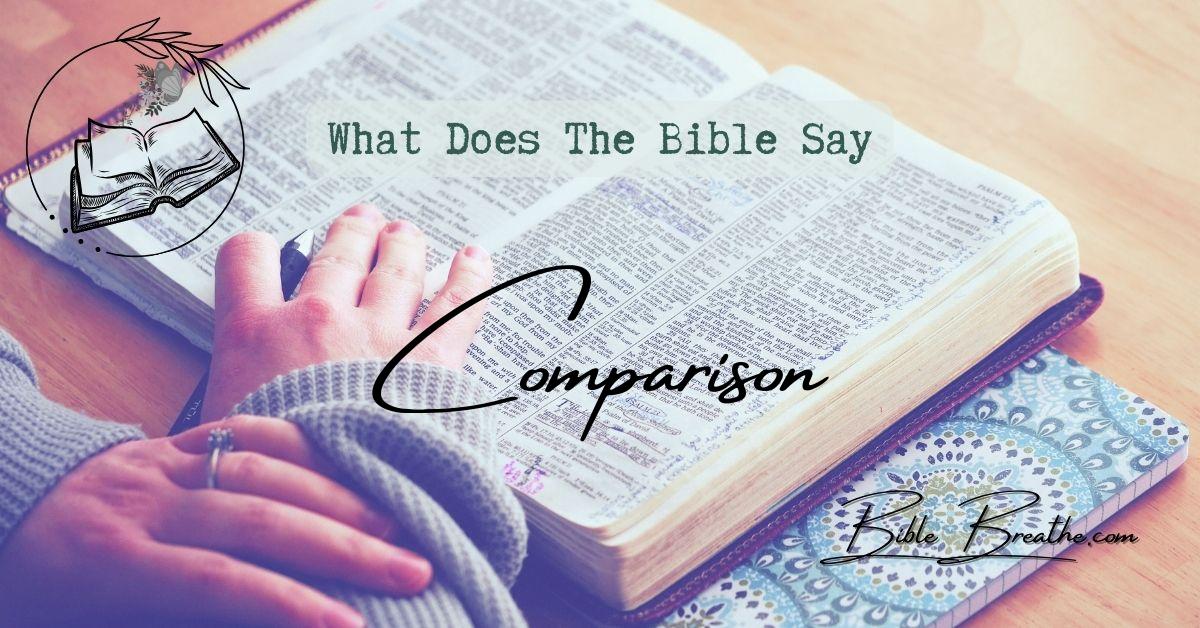What’s the Bible’s take on comparison, fam?
In this world of constant scrolls and endless comparison games, we gotta dig into the Word.
You know, it’s that natural human thing – we can’t help but compare ourselves, especially in this digital age.
But let’s take a page out of the Bible, and I’m not talking about hashtags and filters.
It’s about embracing your true self-worth and finding contentment beyond the likes and follows.
God’s got something to say about this, trust me!
So, why do we fall into the trap of self-deception, thinkin’ we gotta be someone else?
The Bible’s all about embracing those unique gifts God’s given us and walking in His plan.
You’re fearfully and wonderfully made, remember that!
We’re gonna dive deep into the Scriptures, find your identity in Christ, purpose, and wisdom to navigate this digital jungle without losing yourself.
Stay tuned, fam, it’s gonna be lit!
🔥🙏
Key Takeaways
- The Bible cautions against the dangers of comparison, highlighting how it can lead to envy, pride, and a sense of inadequacy.
- It emphasizes the significance of finding our worth and identity in God rather than comparing ourselves to others.
- To overcome the comparison trap, it’s essential to cultivate gratitude, contentment, and a healthy self-image rooted in faith.
- Fostering empathy and encouragement for others, rather than jealousy, helps in breaking free from the cycle of comparison.
- Ultimately, embracing the teachings of the Bible about comparison allows individuals to lead a more fulfilling and purpose-driven life, appreciating their unique journey and value in God’s eyes.
The Bible’s Take on Comparison

Photo modified by BibleBreathe.com. Original photo by GEORGE DESIPRIS on Pexels
In a world where social media showcases everyone’s highlight reels, and success often seems tied to what others have, you might wonder, “What’s the Bible’s say on comparison?”
Well, let’s take a stroll through the Scriptures and discover some profound wisdom.
The Pitfalls of Measuring Up
“We won’t dare to compare ourselves with those who think they are so great. They use themselves to measure themselves, and they judge themselves by what they themselves are. This shows that they know nothing.” – 2 Corinthians 10:12 (KJV)
Picture yourself in a race.
But instead of focusing on your own path, you’re constantly sizing up the competition.
You trip, stumble, and might even give up.
This verse from 2 Corinthians advises against the unwise habit of comparing ourselves to others.
It’s like racing with your eyes glued to everyone else’s progress instead of your unique journey.
Approval from Above, Not from the Crowd
“Am I now trying to win the approval of human beings, or of God? Or am I trying to please people? If I were still trying to please people, I would not be a servant of Christ.” – Galatians 1:10 (KJV)
Imagine you’re on a stage, and the crowd’s applause is thunderous.
It’s tempting to seek their favor, but this verse reminds us that our ultimate goal should be to please God, not people.
Pursuing God’s approval sets us free from the endless chase for human validation.
Reflecting on Ourselves
“Each one should test their own actions. Then they can take pride in themselves alone, without comparing themselves to someone else.” – Galatians 6:4 (KJV)
Think of this verse as a mirror reflecting your own actions and choices.
It encourages us to evaluate our deeds and find joy in our personal growth.
Just as a gardener cares for each plant in their garden, we should nurture our own progress rather than merely comparing ourselves to the flowers in someone else’s garden.
Embracing Humility
“Do nothing out of selfish ambition or vain conceit. Rather, in humility value others above yourselves.” – Philippians 2:3 (KJV)
Consider humility as the secret ingredient in the recipe of life.
It’s recognizing the worth in others, not in a competitive way, but with genuine appreciation.
Humility lets us build bridges instead of walls and creates an atmosphere where comparison loses its power.
In life’s epic journey, comparison can be a tricky foe, leading us away from our true purpose and identity.
Instead, the Bible encourages us to focus on our unique path, seek God’s approval, find joy in self-assessment, and practice humility.
These principles lead to a life that’s content, blessed, and in sync with God’s plan.
Comparing Ourselves in a Social Media World: The Pitfalls

Photo modified by BibleBreathe.com. Original photo by Ana Benet on Pexels
In our journey through the Bible’s wisdom, we often stumble upon life’s burning questions.
One question that burns brightly in today’s age of social media and constant comparison is, “What does the Bible say about comparison?”
It’s a question that resonates with so many of us.
The Allure of Following the Crowd
And be not conformed to this world: but be ye transformed by the renewing of your mind, that ye may prove what is that good, and acceptable, and perfect, will of God.” – Romans 12:2 (KJV)
Imagine you’re in a bustling marketplace, and everyone is flocking towards a glittering stall.
It’s tempting to follow the crowd, thinking they must know something you don’t.
But what if God has a different plan, a unique path just for you?
Going along with the crowd might lead you away from God’s purpose for your life.
The Boomerang of Judgment
For with what judgment ye judge, ye shall be judged: and with what measure ye mete, it shall be measured to you again.” – Matthew 7:2 (KJV)
Think of judgment as a boomerang; whatever you throw out into the world will eventually come back to you.
When we constantly compare ourselves to others and pass judgment, we’re setting a cycle of negativity in motion.
Instead, let’s aim to uplift one another, recognizing that we all have our flaws and struggles.
The Peril of Self-Deception
“For if a man think himself to be something, when he is nothing, he deceiveth himself. But let every man prove his own work, and then shall he have rejoicing in himself alone, and not in another.” – Galatians 6:3-5 (KJV)
Imagine building a house of cards and convincing yourself it’s as solid as a fortress.
Self-deception can be a treacherous road.
When we compare ourselves to others and think we’re superior, we’re essentially fooling ourselves.
True self-assessment is essential for personal growth and humility.
So, what’s the Bible’s take on comparison?
It warns us about the snares of blindly following the crowd, the cycle of judgment, and the pitfalls of self-deception.
Instead, let’s seek God’s approval, embrace the unique gifts He’s given us, and trust in His divine plan.
Find contentment in your identity in Christ.
As we journey through life, let’s trade comparison for gratitude, blessings, and faith.
Remember, your purpose is as unique as the fingerprint of God on your heart.
Bible Stories that Illuminate Comparison

Photo modified by BibleBreathe.com. Original photo by Mike Murray on Pexels
Sometimes, the most profound lessons don’t come in the form of direct commands but unfold through captivating stories within the Bible.
As we seek to uncover what the Bible says about comparison, let’s dive into two remarkable narratives that shed light on this topic.
The Parable of the Vineyard Workers
Life’s vineyards often tempt us to gauge our efforts and rewards against others.
In Matthew 20:1-16 (KJV), there’s a parable about a landowner who hires laborers throughout the day to work in his vineyard.
When it’s time for payment, an unexpected comparison unfolds.
Imagine you’re part of a team; some have toiled since sunrise, while others joined later.
Naturally, you might expect those who worked longer to receive a larger reward.
But the landowner surprises everyone by paying each worker the same wage, regardless of their hours of labor.
This parable challenges our habit of comparing our efforts and rewards with others.
It reminds us that God’s grace is boundless and doesn’t adhere to human standards of fairness.
Instead, it highlights God’s generosity and His sovereignty over our lives.
It urges us to concentrate on our own faithfulness in serving Him, rather than sizing up our fellow laborers.
The Pharisee and the Tax Collector
In Luke 18:9-14 (KJV), there’s another captivating story—the parable of the Pharisee and the tax collector.
This unfolds in a place of worship, where two individuals come to pray.
Picture this: One man, a Pharisee, stands confidently, comparing himself favorably to others.
He thanks God that he’s not like the rest of humanity, highlighting his virtues and religious devotion.
On the other side of the room, a humble tax collector can’t even lift his eyes to heaven.
He beats his chest and begs for God’s mercy, acknowledging his unworthiness.
This story powerfully illustrates the contrast between pride and humility.
The Pharisee’s comparisons lead to self-exaltation and spiritual blindness, while the tax collector’s humble admission of his need for mercy results in justification.
It teaches us that God values a contrite heart over self-righteousness.
In these biblical tales, we witness the consequences of comparison.
The parable of the vineyard workers challenges our concepts of fairness, reminding us of God’s overflowing grace.
The parable of the Pharisee and the tax collector underscores the significance of humility in our approach to God.
Both stories steer us away from comparisons that breed pride and toward attitudes that honor God and His ways.
Escaping the Comparison Trap in the Bible’s Light

Photo modified by BibleBreathe.com. Original photo by Julia Volk on Pexels
As we dive into the timeless teachings of the Bible, one question consistently tugs at our hearts: “What does the Bible say about comparison?”
This question isn’t new; it’s been echoing through the ages, and it’s especially loud in today’s world, where comparisons seem to lurk around every corner.
Discovering Satisfaction in God
Let your conversation be without covetousness; and be content with such things as ye have: for he hath said, I will never leave thee, nor forsake thee.” – Hebrews 13:5 (KJV)
Imagine a child eyeing their friend’s shiny new toy with envy.
The child longs for it, but a loving parent reminds them of the treasures already in their possession.
Similarly, the Bible teaches us to discover satisfaction in God’s constant presence and the blessings He bestows upon us.
When we yearn for what others have, we risk overlooking the beauty in our own lives.
Embracing Our Unique Gifts and Roles
For as we have many members in one body, and all members have not the same office: So we, being many, are one body in Christ, and every one members one of another. Having then gifts differing according to the grace that is given to us, whether prophecy, let us prophesy according to the proportion of faith.” – Romans 12:4-6 (KJV)
Imagine a symphony where each instrument plays a distinct role, contributing to the harmony of the whole.
In a similar way, God has endowed each of us with unique gifts and a purpose within His grand design.
Comparing our gifts to those of others diminishes the beauty of God’s diverse creation.
Embrace your uniqueness and utilize your gifts for His glory.
Trusting in God’s Blueprint for Our Lives
For I know the thoughts that I think toward you, saith the Lord, thoughts of peace, and not of evil, to give you an expected end.” – Jeremiah 29:11 (KJV)
Imagine a ship navigating through a storm, with the captain holding a map, unwavering in their trust that it will guide them safely to their destination.
In life’s storms and uncertainties, we can trust in God’s blueprint for our lives.
He has a purpose, a destination filled with hope and a bright future in mind for each of us.
When we compare our journey to that of others, we risk losing sight of the unique path He has lovingly laid out for us.
So, what wisdom does the Bible offer about comparison?
It encourages us to break free from the comparison trap by discovering satisfaction in God’s presence, embracing our unique gifts, and trusting in His divine plan for our lives.
Instead of dwelling on feelings of inadequacy, let’s embrace our self-worth, nurture our humility, and seek God’s approval above all else.
In our journey of spiritual growth, our identity in Christ shines brightest when we release the grip of comparison and bask in the radiant light of His love.
Frequently Asked Questions (FAQs) About What Does The Bible Say About Comparison
Why does the Bible emphasize not comparing ourselves to others?
The Bible advises against comparing ourselves to others because it can lead to envy, pride, and dissatisfaction.
Instead, it encourages us to find contentment in God’s plan for our lives and focus on our unique journey.
How can one overcome feelings of inadequacy when comparing themselves to others?
Overcoming feelings of inadequacy can be found in embracing the belief that each person is uniquely created by God.
In Psalm 139:14, it’s written, ‘I praise you because I am fearfully and wonderfully made.’ Remembering this truth and focusing on one’s individual purpose and relationship with God can help combat such feelings.
What does the Bible say about comparing our blessings with others?
The Bible warns against comparing blessings with others.
2 Corinthians 10:12 advises against measuring ourselves by others, emphasizing that this isn’t wise.
Envy, jealousy, and discontent can arise when comparing blessings.
Instead, the Bible encourages gratitude for one’s blessings and focuses on personal growth, stewardship, and utilizing one’s gifts to honor God, rather than comparison with others.

